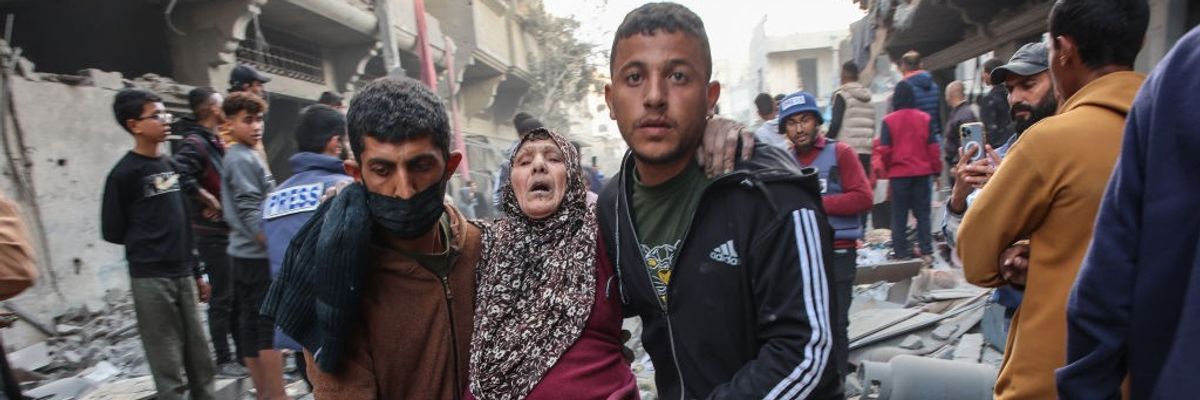It’s disturbing how the US news media flits from story to story, seemingly incapable of sustaining attention on events that require it. The nightmare of Gaza which received in-depth treatment for over a year has now faded from view eclipsed by other dramatic developments in the Arab East.
In recent weeks, news out of the Middle East has been dominated by Israel’s devastating attacks on Lebanon and the now Israeli-enforced “ceasefire.” These days, the major reporting has to do with the al Qaeda spin-off, Hayat Tahrir al Sham, on the move and capturing the major Syrian cities of Aleppo and Hams.
While these developments are, of course, consequential, the continuing war on Gaza and its lingering wounds deserve our attention.
Against this backdrop, it was notable that on a single day this week the New York Times carried three significant stories, filling a full page and a half, on the continuing nightmare in Gaza. The pieces included one on Amnesty International’s new report charging Israel with genocide in Gaza, and another on a deadly Israeli strike in the midst of one of the “humanitarian zones” in Gaza. The largest of the three stories was titled “For the disabled, life in Gaza was always a struggle. Now it’s agony.” Combined, the three describe the horrors of Gaza’s last 14 months, the continuing bombings visited on its displaced Palestinians, and the agonizing future that lays before so many of them.
Just because it’s disappeared from the front pages doesn’t mean it’s not happening.
The Amnesty International story was significant for several reasons. It is, after all, the world’s preeminent human rights organization. When I served a four-year term as a presidential appointee to a US commission that dealt with issues of religious freedom, our annual reports and our own investigations relied heavily on the work of Amnesty. The State Department does as well. Whether dealing with countries in Africa, Asia, or the Arab World, attention is given to what Amnesty has reported. Countries are routinely denounced for their abusive behaviors with the notation “as Amnesty International has reported”—with one exception, and that is, of course, Israel. Amnesty’s work everywhere has been revered, but when it has been about Israel, it has been reviled.
It's therefore quite consequential that Amnesty has taken this bold step to declare quite forcefully that “Israel committed, and is committing genocide against Palestinians in Gaza.” They continue, “Israel’s unlawful conduct throughout its military offensive, resulted in unprecedented harm to Palestinians in Gaza that resulted in the massive scale of killings and serious injuries over a short period of time.”
In response to these charges, the Israelis have followed what has become their familiar script. They “lie, deny, and obfuscate.” And they ultimately fall back on charging their accusers with bias. Interestingly, to date, there has been little or no response from officials in Washington.
That was not the case back in 2022 when Amnesty International and another prominent human rights organization, Human Rights Watch, issued reports finding that Israel had imposed an apartheid system on the Palestinian people under their control. Congress and the White House were quick to denounce both human rights groups—upon whom they rely so heavily for information on other countries.
Also worth noting was the fact that neither the Washington Post nor the New York Times even carried the story about the apartheid charges. This genocide report, on the other hand, has received major coverage in both papers.
It’s heartbreaking to look at the faces of these children sitting in the rubble of destroyed neighborhoods. They are innocents without a future.
The story of the Israeli airstrike in al Mawasi was both cruel and deadly. Cruel because it is supposed to be a humanitarian shelter zone where Palestinians whom Israel ordered to evacuate other areas were supposed to be safe. Bombings of this sort are a daily occurrence, but rarely receive coverage, both because they have become commonplace and because the “big” stories of the day are occurring elsewhere.
Maybe the most disturbing story of the three was the piece about the plight of the disabled in Gaza. Before this war there were 56,000 disabled persons in Gaza. While no new data is available, it is certain that the number has grown significantly in the past year. The Times accompanied its story with pictures of children without limbs lacking wheelchairs, rehabilitation facilities, or surgery when needed. The story describes in some detail the agony confronted by a disabled Palestinian in Gaza who simply needs to go to the bathroom where there are none that can accommodate a wheelchair.
It’s heartbreaking to look at the faces of these children sitting in the rubble of destroyed neighborhoods. They are innocents without a future. It’s hard to imagine living in a crowded tent area in the midst of winter or in the remains of a destroyed building on a bombed-out street. But this is life for hundreds of thousands of Palestinian children.
It’s always painful to face human suffering. But it’s important that we do it, especially in the case of Gaza, because we Americans are in part responsible for it.
Just because it’s disappeared from the front pages doesn’t mean it’s not happening. It is ongoing, and so it’s important that the New York Times brought it home to us one day this week.
